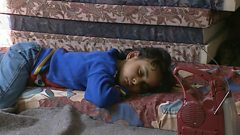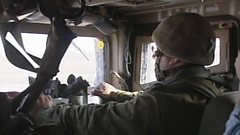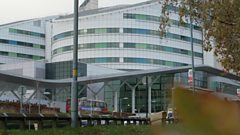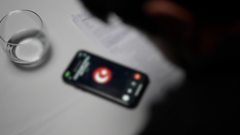
Guildford Four convictions to be appealed
Â鶹ԼÅÄ Secretary Douglas Hurd decides that the case of the Guildford and Woolwich pub bombings should be considered by the Court of Appeal.
Olenka Frenkiel reports on a high profile campaign to free four people convicted of the Guildford and Woolwich pub bombings. Her report begins with Patrick Maguire and his mother Anne looking through press cuttings in their home. Anne Maguire has led the campaign to clear the names of the Guildford Four. She tells Frenkiel that she has prayed for the bombers, the jury which convicted her and the Â鶹ԼÅÄ Secretaries responsible for keeping them in jail.
The report continues with archive footage of the aftermath of the Guildford, Woolwich and Birmingham (21 November 1974) bombs. This is followed by archive of a public march against PIRA bombers, people are holding signs calling for the return of the death penalty.
Historian Robert Key, the author of Trial and Error, believes the convictions are unsafe.
SCREEN GOES BLANK BUT V/O CONTINUES
The Labour MP for Hammersmith, Clive Soley, knew Carole Richardson when he was a Probation Officer in Durham Jail in the mid 1970s and considers her an unlikely terrorist.
The report continues with archive of the Balcombe Street siege; lasting from 6 December to 12 December 1975 the siege ended with the surrender of four PIRA volunteers and the release of two hostages. When the Balcombe Street gang stood trail in January 1977 they claimed responsibility for the Guildford bombings but were never charged.
Cardinal Basil Hume, the Archbishop of Westminster, believes the original convictions are neither safe nor satisfactory.
SOME OVERLAP IN SOUND OCCURS, SCREEN GOES BLANK BUT V/O CONTINUES
Robert Kee is concerned that Carole Richardson was given a drug that causes disorientation before making her confession.
Professor Michael Zander of the London School of Economics explains what the three Court of Appeal judges can do with the new evidence about the Guildford Four –reject the appeal, allow the appeal or send back to trial.
The report ends with Patrick and Anne Maguire in their living room looking at press cuttings. Patrick hopes if the Guildford Four appeal is upheld it will discredit the evidence that put him and his family in jail.
CONTEXT
On 5 October 1974 the Provisional Irish Republican Army (PIRA) targeted Guildford, Surrey, because it was situated close to a number of garrison towns. The PIRA planted two six-pound gelignite bombs in two pubs. The first exploded just before 9.00pm in the Horse and Groom, destroying the front of the building and shattering the windows of neighbouring shops.
It killed Paul Craig, a plasterer (22 years old); two members of the Scots Guards, William Forsyth (18) and John Hunter (17); and two members of the Women’s Royal Army Corps, Caroline Jean Slater (18) and Ann Ray Hamilton (19). A further sixty-five persons were wounded.
After the first explosion, other public houses were evacuated, including the Seven Stars where the second bomb exploded at approximately 9.35 p.m. without causing any serious injuries.
On November 7 1974 Gunner Richard Dunne, a soldier (42) and Alan Horsley, a sales clerk (20) were killed when a PIRA bomb exploded in the King’s Arms in Woolwich. Twenty-six people, including five soldiers, were injured.
In December 1974 the police arrested three men and a woman: Gerry Conlon, Paul Hill, Patrick Armstrong and Carole Richardson. In October 1975 these four were convicted of the Guildford and Woolwich bombings and given life sentences. The group was known as the Guildford Four.
On 4 March 1976 the Maguire Seven were convicted of making the explosives used in these bombings. The Maguire Seven were: - Anne Maguire, Patrick Maguire (Anne’s husband), Patrick Maguire (son of Anne and Patrick), Vincent Maguire (son of Anne and Patrick), Sean Smyth (brother of Anne), Patrick O’Neill (family friend) and Giuseppe Conlon (brother-in-law of Anne Maguire and father of Gerry Conlon).
Over the years, the cases of the Guildford Four and the Maguire Seven came under increasing legal scrutiny and the range of those seeking a review of the convictions extended widely. On 17 October 1989 it was announced that corruption proceedings would be taken against the police involved in the conviction of the Guildford Four. Two days later, with the exception of Paul Hill, those convicted for the bombings were released. This followed an announcement by the Director of Public Prosecutions that it would be wrong for the Crown ‘to seek to sustain’ the convictions of 1975 on the basis of confessions that they had later retracted. The Court of Appeal had decided that the DPP in 1975 had suppressed scientific evidence which conflicted with the confessions. Paul Hill remained in custody because he was implicated in a case that had not yet been resolved. His conviction was eventually quashed in April 1994.
On 26 June 1991 the Court of Appeal overturned the sentences on the Maguire Seven. All of them had completed their sentences. Afterwards many criticised the court for dismissing most of the grounds of appeal and had simply concluded that the hands of the convicted could have been
innocently contaminated with nitro-glycerine.
Duration:
This clip is from
More clips from Newsnight
-
![]()
Archive: Life inside Gaza’s front line town of Rafah (2004)
Duration: 11:24
-
![]()
Archive: Israeli soldiers search for tunnels in Gaza (2004)
Duration: 10:48





